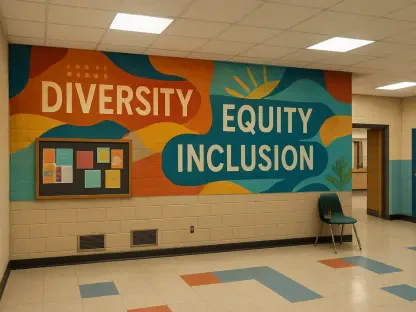The state of North Carolina is embarking on an ambitious journey to modernize its K-12 educational system through new digital learning initiatives. With the allocation of $1.8 million to fund 11 diverse projects set to launch in the 2024-2025 school year, the state aims to leverage cutting-edge technologies such as artificial intelligence (AI), virtual reality (VR), and podcasting to enhance the educational experience for students and educators alike. The introduction of these initiatives represents a significant investment in the future of education, seeking to equip both students and teachers with the skills necessary to navigate a rapidly evolving technological landscape. This comprehensive approach is designed to address various educational needs across different districts, ensuring that the benefits of the grants can be felt statewide.
The North Carolina Digital Learning Initiative Grants not only focus on the professional development of teachers but also emphasize curriculum development and the creation of AI tools for educational and organizational purposes. By embedding AI technologies deeply into the K-12 education system, projects like those in Catawba County Schools aim to revolutionize how education is delivered and administered. This initiative underscores the state’s commitment to preparing students for a future where digital literacy and technological proficiency are paramount. The grants are part of a broader effort to modernize the state’s education system, making it more interactive, engaging, and suited to meet the demands of the 21st century.
Emphasis on AI in Education
The integration of AI in the education system is a key focus of the North Carolina Digital Learning Initiative Grants. These grants are designed to facilitate comprehensive professional development for teachers, fostering an environment where AI-driven curricula can thrive. For instance, Catawba County Schools will embed AI technologies deeply into their K-12 system. This involves the development of AI-driven curricula that not only educate students about AI but also use AI to enhance teaching and administrative processes. Teachers will receive specialized training to help them incorporate AI into their lessons effectively, ensuring that both students and educators benefit from the new technology.
AI’s potential in education extends beyond just teaching students about the technology. It includes creating personalized learning experiences that can adapt to each student’s needs, potentially transforming traditional pedagogical approaches. AI tools can help educators identify students’ strengths and weaknesses more effectively and tailor their teaching methods accordingly. Moreover, AI technologies can assist in organizational planning, providing analytical tools to streamline administrative tasks, thereby allowing educators to focus more on teaching. By integrating AI at multiple levels, the North Carolina Digital Learning Initiative aims to create a more efficient, responsive, and personalized educational environment.
Enhancing Science Education Through VR
A significant portion of the grant funding will go towards enhancing science education using VR. Guilford County aims to address the observed decline in science proficiency by making science lessons more interactive and engaging. Six middle schools will utilize grant funds to equip and train eighth-grade science teachers with the necessary tools to develop VR-based lessons. This initiative is particularly timely, as the post-pandemic era has highlighted the need for innovative approaches to re-engage students in STEM subjects. VR technology will provide immersive learning experiences, making complex scientific concepts easier to grasp and more engaging for nearly 5,000 students. This initiative is expected to not only boost science proficiency but also ignite a passion for STEM subjects among students.
By incorporating VR into the curriculum, these projects aim to break down barriers that often make science feel abstract and challenging for students. The immersive nature of VR can bring abstract concepts to life, allowing students to explore scientific phenomena in a controlled, virtual environment. This hands-on approach is likely to foster a deeper understanding and retention of scientific knowledge, making learning more effective and enjoyable. The initiative also aims to improve equity in science education by providing high-quality, engaging resources to schools that might otherwise lack the means to invest in such technologies. By addressing both engagement and accessibility, the VR projects funded by the grants promise to make a significant impact on science education in North Carolina.
Podcasting and Emerging Technologies
Another innovative project involves the implementation of mobile podcasting studios in schools. Starting as early as the fourth grade, students will have the opportunity to engage in hands-on content creation and broadcasting. These studios will provide students with a platform to build communication skills, explore creative expression, and gain practical experience in a growing field. Podcasting as an educational tool offers a unique blend of creativity, technical skill, and digital literacy, making it an ideal project for fostering a wide range of competencies. By giving students the tools and training to produce their podcasts, the initiative aims to harness the power of storytelling and digital media to enhance traditional learning methods.
The use of podcasting in education also serves to democratize content creation, offering students from diverse backgrounds a voice in the digital landscape. This experience can be particularly empowering, helping young learners to build confidence and develop a sense of agency. Additionally, the project aligns with broader educational goals by encouraging collaboration, critical thinking, and project management skills. Through the medium of podcasting, students can delve into topics of interest, conduct interviews, and produce content that reflects their unique perspectives. This hands-on approach not only makes learning more engaging but also prepares students for future opportunities in a digitally-driven world.
Boosting Digital Literacy
Digital literacy is a crucial skill that the funded projects aim to enhance across the board. As digital technologies become increasingly integral to both education and the workplace, equipping students with robust digital skills is seen as essential for their success post-graduation. The grants aim to ensure students are comfortable and proficient with digital tools, preparing them for a digitally advanced world. This focus on digital literacy includes teaching students how to safely and effectively use technology to access, evaluate, and create information. It also encompasses a broader understanding of digital citizenship, ensuring that students are aware of ethical considerations and responsible online behavior.
Projects funded by the grants are designed to provide a holistic approach to digital literacy, addressing both technical and ethical dimensions. For instance, curriculum development may include modules on cybersecurity, data privacy, and the impact of digital technologies on society. By fostering a comprehensive understanding of these issues, the initiatives aim to create not just skilled users of technology, but informed and responsible digital citizens. This dual focus on skill development and ethical awareness is crucial for preparing students to thrive in a complex, interconnected world. As such, the digital literacy projects funded by the North Carolina Digital Learning Initiative represent a forward-thinking investment in the state’s educational future.
Meeting the Needs of Diverse Educational Contexts
The diversity of the funded projects reflects a strategic approach to addressing various educational needs across North Carolina. By funding a wide range of initiatives, the state acknowledges that different schools and districts may require unique solutions. This approach ensures that the benefits of the grants can be felt across a broad spectrum of educational settings. Whether it’s urban or rural, affluent or under-resourced, each educational context can leverage the funding to implement the technological advancements that best meet their specific requirements. This inclusive strategy aims to create equitable opportunities for all students, regardless of their background or location.
One of the key strengths of this approach is its flexibility. By allowing schools to tailor their projects to their specific needs, the grants can support a variety of innovative solutions. This could include initiatives focused on STEM education, digital literacy, or the integration of AI and VR technologies. The adaptability of the funding ensures that the technology is not a one-size-fits-all solution but a customized tool to enhance learning outcomes in diverse contexts. This approach recognizes that educational challenges and opportunities can vary widely, and a flexible, responsive funding model is essential for meeting these varied needs effectively.
Professional Development for Educators
North Carolina is on an ambitious path to modernize its K-12 education system through innovative digital learning initiatives. Allocating $1.8 million to fund 11 diverse projects for the 2024-2025 school year, the state aims to incorporate advanced technologies like artificial intelligence (AI), virtual reality (VR), and podcasting into the educational experience. This investment signifies a major commitment to the future of education, providing students and teachers with the skills needed for a technologically evolving world. The comprehensive approach targets various educational needs across districts, ensuring the statewide impact of these grants.
The North Carolina Digital Learning Initiative Grants focus not only on the professional growth of teachers but also on curriculum development and the creation of AI tools for educational and administrative purposes. Projects in places like Catawba County Schools aim to revolutionize education delivery and management by deeply integrating AI technologies. This initiative highlights North Carolina’s dedication to preparing students for a future where digital literacy and tech proficiency are essential. These grants are part of a broader push to modernize education, making it more interactive, engaging, and ready to meet 21st-century demands.









